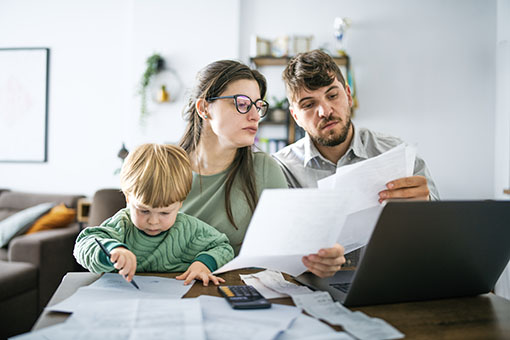How to calculate closing costs
Use this closing cost calculator to estimate your overall closing expenses for buying a home. In just a few steps, you’ll get a personalized estimate based on your home price, down payment and state.
Your Results
Based on the information you entered, your estimated home closing cost would be:
| Estimated Closing Costs | |
|---|---|
| $1,763 - $2,000 | |
These estimates are provided for informational purposes only. Always consult a banker for your individual situation.
How to use this closing cost calculator
Sample numbers are provided so you can see how the calculator works before entering your own details.
- Enter the total price of the home you are buying in the Purchase Price field. This sets the baseline for your loan amount and estimated closing costs.
- Type in the amount you plan to pay upfront toward the purchase in the Down Payment field.
- If you know the exact amount in dollars, select the $ option.
- If you only know the percentage of the purchase price (for example, 10% or 20%), select the % option and enter that number.
- The calculator will adjust your loan amount and closing costs based on this input.
- Choose the state where the property is located from the dropdown menu. Closing costs vary by state, so selecting the right location gives you a more accurate estimate.
How to read your closing cost calculator results
The calculator gives you an estimated range of closing costs based on the purchase price, down payment and state you entered. Here’s how to interpret what you see:
- Estimated closing costs range: The two numbers (for example, $1,763–$2,000) represent the typical range you might expect to pay at closing. Your actual costs may be higher or lower depending on your loan details, lender fees and local taxes.
- Why it’s a range: Closing costs include several types of fees (like appraisal, title insurance, recording and taxes), which vary from state to state and even lender to lender. The range give you an estimate rather than a single number.
- How to use it: Use this estimate to plan your budget and compare options when shopping for a mortgage. When you apply, your lender will provide a Loan Estimate with a detailed breakdown of your actual costs.
Tip: If you’re comparing homes in different states or changing your down payment amount, run the calculator again to see how your closing cost estimate changes.
What are closing costs and who pays what?
Closing costs are the fees and expenses you pay to finalize a real estate transaction. They cover the services, paperwork and taxes required to transfer ownership of a home. Both buyers and sellers have closing costs, but they have different expenses.
Buyer closing costs: Closing costs often include lender fees (like loan origination and appraisal), title insurance, escrow services, property taxes and homeowners insurance. These typically add up to 3%–5% of the loan amount.
Seller closing costs: Usually higher in dollar amount, often 6% to 10% of the home’s sale price. The largest portion is the real estate agent commissions, but sellers may also pay transfer taxes, title fees, and in some cases a portion of escrow fees.
Why they matter: Closing costs can significantly impact your budget. Knowing what to expect helps you plan ahead and avoid surprises when it’s time to close on your home.
Key takeaway:
- Buyers pay most of the loan-related fees.
- Sellers pay commissions and ownership transfer costs.
- In many deals, the two sides split certain shared fees (like escrow).
Tip: Before closing, buyers receive a Loan Estimate and later a Closing Disclosure outlining all fees. Sellers receive a Closing Disclosure that breaks down their costs, including commissions. Always review the Buyers Loan Estimate and the Seller’s Closing Disclosure to see your exact responsibilities before closing day.
How much are closing costs?
Closing costs usually range from 3% to 5% of your home’s purchase price when financing with a mortgage. On a $250,000 home, that means you could expect to pay between $7,000 and $12,500 in closing costs.
Factors that affect the amount:
- Home price & loan amount: Higher-priced homes and larger loans mean higher fees for services like title insurance and origination.
- Location: State and local taxes, recording fees and required services vary by region.
- Loan type: Government-backed loans (FHA, VA, USDA) may have specific fees, such as upfront mortgage insurance or funding fees.
- Lender fees: Origination, underwriting and processing fees differ by lender.
- Prepaid expenses: These include homeowners insurance, property taxes and daily interest from the day of closing to the end of the month.
Cash buyers: Even without a mortgage, expect to pay 1% to 3% of the purchase price in closing costs for items like title insurance, escrow fees and transfer taxes.
Tip: Ask your lender for a Loan Estimate early in the process. It provides a line-by-line breakdown of estimated closing costs, so you know what to budget for.
What is included in closing costs?
Closing costs are a collection of fees and expenses you pay when finalizing your home purchase. While the exact amounts vary by lender and state, they often include, but are not limited to:
- Loan origination fee: Charged by the lender for processing and creating your mortgage.
- Appraisal fee: Pays for a professional assessment of the home’s market value.
- Credit report fee: Covers the cost of pulling your credit history.
- Title search and title insurance: Ensures the seller has the legal right to transfer the property and protects against ownership disputes.
- Recording fees: Paid to your local government to officially record the property transfer.
- Attorney fees (if applicable): Required in some states for reviewing documents and closing the transaction.
- Escrow deposit/prepaids: May include initial deposits for property taxes, homeowner’s insurance and mortgage insurance, if required.
- Other local or state taxes/fees: Costs that vary depending on where you buy, such as transfer taxes or deed recording fees.
Tip: When you apply for a mortgage, your lender must provide a Loan Estimate that outlines these costs, followed by a Closing Disclosure with your exact charges before closing day.
Can I negotiate my closing costs?
Yes, in many cases, you can reduce or negotiate certain closing costs. While some fees are set by state law or third-party providers, others are flexible. Here are strategies to consider:
- Compare lenders: Different lenders charge different fees. Shopping around can save you hundreds of dollars.
- Negotiate lender fees: Some costs, like application, processing or underwriting fees, may be reduced or waived if you ask.
- Choose your own providers: For services like title insurance or inspections, selecting your own provider may lower costs.
- Ask the seller: In some transactions, you can negotiate seller concessions to cover part of the costs.
Tip: While not every fee is negotiable, reviewing your Loan Estimate carefully and asking the right questions can make a meaningful difference in what you pay at closing.
When do I pay closing costs?
Closing costs are typically due at the time you finalize your home purchase (also known as the closing day). This is the meeting where ownership of the home officially transfers to you.
- Timing: Most buyers pay their closing costs on the same day they sign their final loan documents.
- Method of payment: Closing costs are usually paid with a cashier’s check or wired funds, not a personal check.
- What you’ll receive: Before closing, your lender will provide a Closing Disclosure, which lists the exact amount you’ll need to bring. This document is delivered at least three business days before closing.
- Exceptions: In some cases, certain costs may be paid earlier (such as the appraisal fee or credit report fee) or rolled into the loan if your lender allows it.
Tip: Review your Closing Disclosure carefully and confirm the final payment method with your lender or closing agent to avoid last-minute surprises.
Can closing costs be included in the loan?
In many cases, yes—some or all of your closing costs can be rolled into your mortgage instead of being paid upfront at the closing table. This is sometimes called “financing your closing costs.”
- How it works: Instead of bringing cash to cover certain fees, the lender adds them to your total loan balance. You’ll then pay them off over time as part of your monthly mortgage payment.
- Pros:
- Reduces the amount of money you need to bring on closing day.
- Can make buying a home more affordable in the short term.
- Cons:
- Increases your total loan balance.
- Means you’ll pay interest on those costs over the life of the loan, which raises the overall cost of the home.
- Limitations: Not all costs can be financed, and eligibility depends on your loan type, lender policies, and loan-to-value ratio. Government-backed loans (FHA, VA, USDA) often allow more flexibility.
Tip: Ask your lender which costs can be rolled into your loan and compare the long-term expense of financing them versus paying upfront.
Are there closing costs for an all-cash purchase?
Yes, even if you buy a home with cash and don’t take out a mortgage, you’ll still have some closing costs. They’re usually lower than when financing with a loan, but they still cover essential services required to transfer ownership.
Key difference: With cash purchases, you avoid lender-related fees such as loan origination, appraisal required by the bank and mortgage insurance.
Tip: Even without a mortgage, budgeting 1%–3% of the purchase price for closing costs is a safe estimate, depending on your state and local requirements.
What is the most expensive closing cost?
Closing costs include many different fees, but a few stand out as the largest expenses for most homebuyers:
- Loan origination fee – This is charged by your lender for processing and creating your mortgage. It’s often 0.5% to 1% of the loan amount, making it one of the highest single costs.
- Title insurance – Protects you and your lender against claims on the property’s ownership. Depending on the home’s price and your state, this can run into the thousands.
- Appraisal fee (when financing) – Required by lenders to confirm the home’s value. While smaller than the two above, it can still be several hundred dollars and unavoidable if you’re financing.
Tip: The “most expensive” closing cost varies depending on the loan size and state regulations. In high-value home purchases, title insurance often tops the list, while for mid-range mortgages, the loan origination fee tends to be largest.
Related mortgage tools and calculators
Calculating your closing costs is just one piece of the homebuying puzzle. To get a complete picture of your budget and financing options, try these other helpful calculators:
- HELOC payment calculator: See how much your monthly payments might be if you tap into your home equity for renovations, debt consolidation or other expenses.
- Mortgage qualification calculator: Find out how much home you may qualify for based on your income, debts and financial profile.
- Fixed-rate mortgage calculator: Estimate your monthly payments for a traditional fixed-rate loan and compare scenarios over different terms (15-year vs. 30-year).
Using these tools together gives you a clearer view of both your upfront closing costs and your long-term financial commitments.





